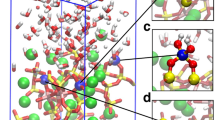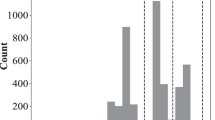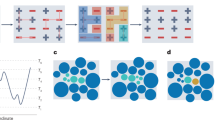Abstract
IN a paper to be published elsewhere1, algorithms and Fortran II programmes for computing liquidus temperatures and compositions in multicomponent ionic salt systems are discussed in some detail. The following is a preliminary report to the effect that simplified analogous programmes can be used for computing liquidus relationships in multicomponent silicate systems.
This is a preview of subscription content, access via your institution
Access options
Subscribe to this journal
Receive 51 print issues and online access
$199.00 per year
only $3.90 per issue
Buy this article
- Purchase on Springer Link
- Instant access to full article PDF
Prices may be subject to local taxes which are calculated during checkout
Similar content being viewed by others
References
Canad. Mineralogist.
Tuttle, O. F., and Bowen, N. L., Geol. Soc. Amer. Mem., 74 (1958).
Daly, R. A., Igneous Rocks and the Depths of the Earth (McGraw-Hill, 1933).
Smith, F. G., Physical Geochemistry, 281 (Addison-Wesley, 1963).
Author information
Authors and Affiliations
Rights and permissions
About this article
Cite this article
SMITH, F. Computation of Liquidus Relationships in Multicomponent Silicate Systems. Nature 204, 370–371 (1964). https://doi.org/10.1038/204370a0
Published:
Issue Date:
DOI: https://doi.org/10.1038/204370a0
This article is cited by
-
Petrology of pelitic schists and gneisses of Chaubattia-Ranikhet area, Almora district, Uttar Pradesh, India
Geologische Rundschau (1971)
Comments
By submitting a comment you agree to abide by our Terms and Community Guidelines. If you find something abusive or that does not comply with our terms or guidelines please flag it as inappropriate.



